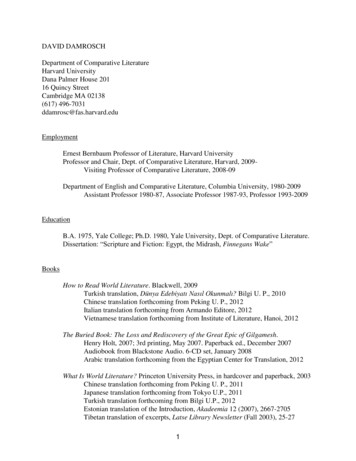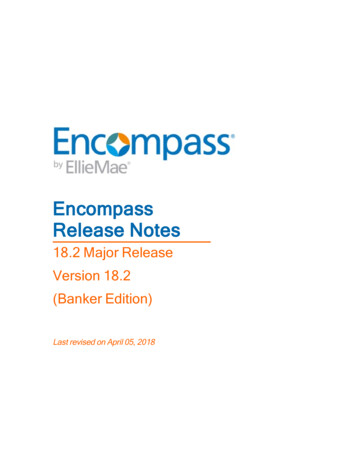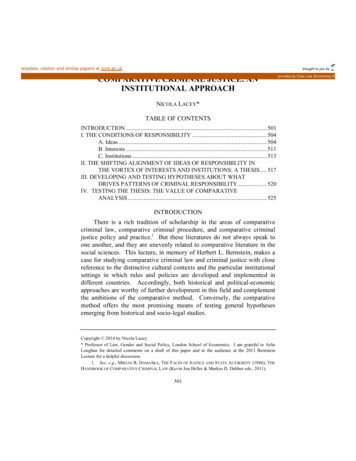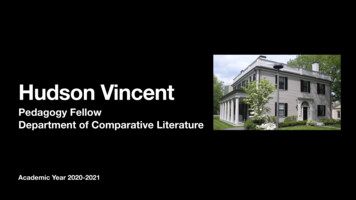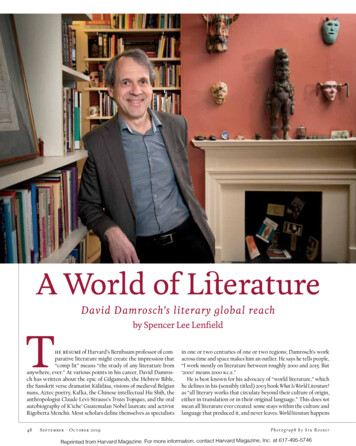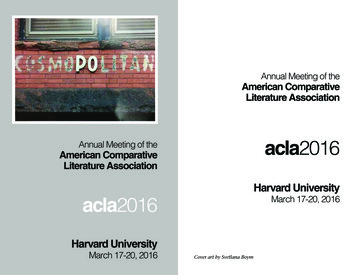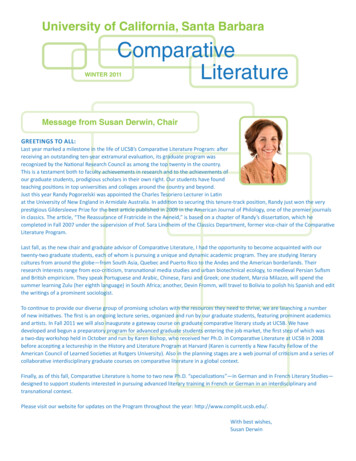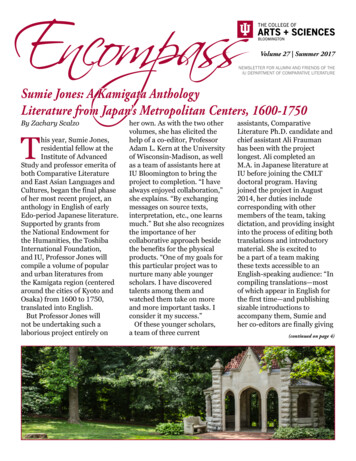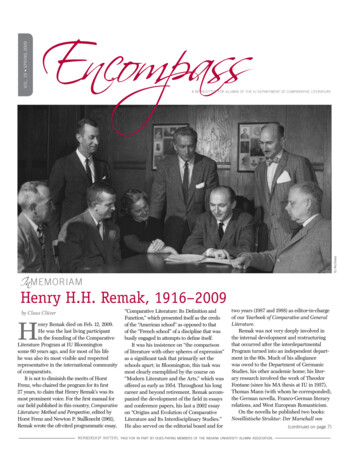
Transcription
Vol. 19 Spring 2009EncompassIU ArchivesA newsletter for alumni of the IU Department of comparative LiteratureInmemoriamHenry H.H. Remak, 1916–2009by Claus ClüverHenry Remak died on Feb. 12, 2009.He was the last living participantin the founding of the ComparativeLiterature Program at IU Bloomingtonsome 60 years ago, and for most of his lifehe was also its most visible and respectedrepresentative in the international communityof comparatists.It is not to diminish the merits of HorstFrenz, who chaired the program for its first27 years, to claim that Henry Remak’s was itsmost prominent voice. For the first manual forour field published in this country, ComparativeLiterature: Method and Perspective, edited byHorst Frenz and Newton P. Stallknecht (1961),Remak wrote the oft-cited programmatic essay,Membership Matters.“Comparative Literature: Its Definition andFunction,” which presented itself as the credoof the “American school” as opposed to thatof the “French school” of a discipline that wasbusily engaged in attempts to define itself.It was his insistence on “the comparisonof literature with other spheres of expression”as a significant task that primarily set theschools apart; in Bloomington, this task wasmost clearly exemplified by the course on“Modern Literature and the Arts,” which wasoffered as early as 1954. Throughout his longcareer and beyond retirement, Remak accompanied the development of the field in essaysand conference papers, his last a 2002 essayon “Origins and Evolution of ComparativeLiterature and Its Interdisciplinary Studies.”He also served on the editorial board and fortwo years (1987 and 1988) as editor-in-chargeof our Yearbook of Comparative and GeneralLiterature.Remak was not very deeply involved inthe internal development and restructuringthat occurred after the interdepartmentalProgram turned into an independent department in the 60s. Much of his allegiancewas owed to the Department of GermanicStudies, his other academic home; his literary research involved the work of TheodorFontane (since his MA thesis at IU in 1937),Thomas Mann (with whom he corresponded),the German novella, Franco-German literaryrelations, and West European Romanticism.On the novella he published two books:Novellistische Struktur: Der Marschall vonpaid for in part by dues-paying members of the indiana university alumni association.(continued on page 7)
from the chairComparative Literature at 60In 1949, a group of IU faculty gathered together toinstitute a new program which is today the Departmentof Comparative Literature. It was a historic beginning,captured with a photograph that we have reproduced here foryou (see cover photo). Among those at that meeting was ourbeloved Henry Remak, who passed on last month.Since that moment 60 years ago, the discipline and the department have undergone innumerable shifts, just as the worlditself has been transformed by seismic political and social eventssince the 1950s. For Henry Remak, writing in 1961, comparativeliterature was “the study of literature beyond the confines of oneparticular country, and the study of the relationships betweenliterature on the one hand, and other areas of knowledge andbelief, such as the arts. . It is the comparison of one literaturewith another or others, and the comparison of literature withother spheres of human expression” (Stallknecht and Frenz, Eds.Comparative Literature: Method and Perspective, 3).Never, I suspect, have we been more in tune with thatprescient vision of comparative literature than today, whenthe department offers translation workshops and courses ontheories of transnational literary study, on literature and othermedia and arts, and on literature and its intersections with otherdisciplines, from humanities and social sciences to biology.Our Yearbook of Comparative Literature, too, will mark atransition this year as the new editor, Assistant Professor EyalPeretz, dedicates his first issue to a consideration of the relationship between literature and the “world.”To mark these 60 years, to celebrate the life of ProfessorEmeritus Henry Remak, and to assess the role of comparativeliterature in engaging the pressing issues of the day, the department will hold a series of events in 2009–2010. You will hearabout these as the time draws near. We hope that some of youwill make your way back to Bloomington to join us.This issue of Encompass has a new look. It includes student,faculty, and emeriti news, and a remembrance of Henry Remakby Professor Emeritus Claus Clüver. We included a book corner,where you can get a glimpse of new works by our faculty. Inthis issue, we also announce our new Undergraduate StudentAdvisory Board, introduce one of our graduate students, LailaAmine, and new faculty members Sarah Van der Laan andKevin Tsai. Finally, we profile an alumna, Irene Montjoye, whovisited us in time for the spring reception in 2008.You may stay in touch and send us your news via the IUAlumni Association or directly at complit@indiana.edu. Weneed you in our future!Good wishes.— Eileen Julien, professor and department chairnews briefIntroducing Sarah Van der LaanComparative Literature to welcome new faculty member in 2009–2010Born and raised in Del Mar, Calif., SarahVan der Laan moved east at 18 in searchof seasons. She graduated summa cumlaude from Yale University with a BA inRenaissance studies before continuingher studies at Queen Mary College of theUniversity of London, where she earnedmaster’s degrees with distinction in bothRenaissance studies and intellectual andcultural history.While in London, Van der Laan alsostudied the British art of queuing in allweathers for inexpensive theatre andconcert tickets. She then returned to Yalefor a joint PhD in Renaissance Studies2and English, which she completed in2008.Her dissertation, “‘What Virtue andWisdom Can Do’: Homer’s Odyssey inthe Renaissance Imagination,” charts thecultural history of the Odyssey throughthe Renaissance, recovering Renaissancereadings of Homer’s poem and usingthem to provide a context for the revisions of the Odyssey by major epic poetsof the Renaissance: Lodovico Ariosto,Torquato Tasso, Edmund Spenser, andJohn Milton.Van der Laan is currently a post-doctoral researcher in the English depart-ment of theUniversitéde Genève,where sheteaches andresearchesthe earlypublicationof Shakespeare andhis contemporary Elizabethan and Jacobeandramatists, under the direction of LukasErne. She has published articles on Milton and the Odyssey.
Faculty newsResearch & highlightsProfessor Vivian Nun Halloran organized the panel “Blackness andBelonging in Contemporary Dominican and Puerto Rican Narratives” for(Re) Visioning the Black Caribbean: Spaces, Places & Voices, at the 24th annualSymposium on African and American Culture & Philosophy that took placeat Purdue University in November, 2008. Two Comparative LiteratureDepartment PhD students, Laila Amine and Ed Chamberlain, also presentedtheir work on Caribbean literature in the panel.In a special issue of the Yearbook of Comparative and General Literature(53), Professor David Hertz published papers from two conferences heorganized. “Mutability Around the World,” featured the work of scholars fromIndia and Italy. The other set of papers, from a symposium on “Beethoven andBiography,” includes essays by Harvard musicology professor Lewis Lockwood and Robert Hatten, a noted Beethoven scholar from the IU School ofMusic. Hertz re-joined the National Council on the Humanities in the springof 2008. His work there continues until 2014.In fall 2008 Bill Johnston published a new translation: Peregrinary by contemporary Polish poet Eugeniusz Tkaczyszyn-Dycki (Zephyr Books). In January the book was a finalist for the poetry category of Three Cent’s new BestTranslated Book of the Year award. Translations from this book also appearedin Modern Poetry in Translation and Seneca Review. Johnston is currently onresearch leave in Poland, where he appears weekly on a Poland’s Channel1 television show about books. His translation of Jerzy Pilch’s brilliant 2000novel The Mighty Angel is to be released this spring by Open Letter.Professor Herb Marks and Professor Rosemarie McGerr were jointlyawarded the Henry H. H. Remak Professorship in 2008. The award is rotatedtri-annually between the departments of Germanic Studies, West EuropeanStudies, and Comparative Literature. The Remak Professorship, created byRemak’s former student Larry H. Lee, is awarded to a tenured faculty memberwho exhibits outstanding undergraduate teaching and a commitment to students as individuals.Herb Marks and Rosemarie McGerr were jointlyawarded the Henry H. H. Remak Professorship.Adjunct Professor Darlene Sadlier published the book Brazil Imagined:1500 to the Present. (University of Texas Press, 2008)In June 2008, Miryam Segal participated in a faculty summer instituteon “Forms of Life in Emily Dickinson’s Poetry,” at the National HumanitiesCenter in North Carolina. As part of a May 2008 series on Women’s Studies inReligion at the Harvard Divinity School, Segal lectured on “Gender and Authorship in Hebrew Poetry: Scripture, the National Poet, and the Small Groupof Women.” Also, in June 2008 she spoke on “Working Women and the Rise ofWomen’s Poetry in Hebrew” as part of a panel on Immigrants, Workers, Women – Literary Representation. In December 2008, she spoke at the Associationfor Jewish Studies Conference in a panel on Reading Gender in Hebrew Literature. The title of her talk was “Towards a New History of Women’s Poetryin Hebrew.” Her book A New Sound in Hebrew Poetry: Poetics, Politics, Accentwas published this month by Indiana University Press.Suzanne Pinckney Stetkevyich, an adjunct professor, recently finisheda book manuscript on The Mantle Odes: Praise Poems to the Prophet Muhammad in the Arabic Literary Tradition. Currently a National Endowment for theHumanities Fellow at the American Research Center in Cairo, Sttkevych presented two papers in Arabic this spring: “Ahmad Shawqı̄ and the Reweavingof the Burdah” at the Cairo University Conference on Language & Literaturein 20th Century Islamic Studies”; and “FromRepresentation to Abstract Expressionism:Interpreting Ma arri’s Saqt al-Zand andLuzu miyya t,” at the Supreme Council forCulture Second International Conference onArabic Poetry. The Arabic translation of her1991 book Abu Tamma m and the Poetics of the Abba sid Age appeared in Fall 2008 (Al-Shi rwa al-Shi riyyah fi al- Asr al- Abba sı̄, trans.Dr. Hasan al-Banna Izz al-Dı̄n, NationalCenter for Translation, Cairo, Egypt). Heredited volume, Poetry and Poetics, in the Ashgate Formation of the Classical Islamic Worldseries, will appear shortly.In Spring 2008 Stetkevych presented twopapers on: “Orality, Literacy, and the Semiotics of Rhetoric in Arabic Poetry” at the Orality and Literacy VII Conference at Rice University in Houston, Texas; and “Al-Ma arrı̄’sMı̄miyyah from Saqt al-Zand” at the RutgersWorkshop in Arabic Poetry and Translation,held in Rutgers, N.J. In summer 2008 shepresented at the Yarmouk University Conference in Literary Criticism XII, Irbid, Jordan.She also organized a panel and contributeda paper to the November 2008 Middle EastStudies Association Annual Meeting, held inWashington, D.C.Kevin Tsai is now extracting usable bitsfor his book from his dissertation, The Allusive Manufacture of Men, which he completedlast year. He has been appointed assistantprofessor at IU, and is looking forward toseeing spring blossoms again in Bloomington. This summer he will teach an IntensiveFreshmen Seminar entitled “Human Naturefrom Plato to the Sopranos,” which gives hima chance to renew his soul’s acquaintancewith ancient philosophy from a previous life.Emeriti newsIn December, Salih Altoma presented“Arab-American Literary Relations: 19502008” at the special forum on Arab-AmericanRelations in Doha, Qatar. Altoma published“Waiting for the Mahdi, ” a translation ofa poem by the Lebanese poet MohammadAli Shams Al-Din; “Shawqi and the West:1894-2006,” in Dawrat Shawqi and Lamartine,which received the Foundation of AbdalazizSaud Al-Babtain’s Prize for Poetic Creativityfor 2008; and a Review of Contemporary IraqiFiction: An Anthology, edited and translatedfrom the Arabic by Shakir Mustafa, in theSayyab Translation Journal.Ernest Bernhardt-Kabisch continuesto occupy his retirement by translating fromGerman. Last year, his translation of Con(continued on page 4)3
Emeriti news(continued from page 3)stantin Floros’s Alban Berg and HannaFuchs: The Story of a Love in Letters waspublished by Indiana University Press.This year he brought out a translationof a biography of Maria InnocentiaHummel, the nun who originatedthe famous “Hummel figures”: M.I.Hummel: I Want to Give Joy, A FatefulWoman’s Career, written by Dido Nitzand published by ArsEdition in Munichon the occasion of the centenary of Sr.Hummel’s birth. He also translated intoEnglish some radio plays and an artessay. He is currently translating a bookabout Brahms.Peter Boerner participated in theColloque international en l’honneur duProfesseur Gonthier-Louis Fink dealingwith “Nouveaux regards sur l’oeuvrenarrative de Goethe,” which took placein Strasbourg, France, in November2008. In April 2009 he traveled to Estonia. In the university town of Tartu, anEstonian translation of his monographon Goethe was presented to the public.Boerner was born in Tartu and spentthe first four years of his life there. Hisbook, originally written in German,has previously been translated into 10European and Asian languages.Gilbert Chaitin published twobooks, The Enemy Within: CultureWars and Political Identity in Novels ofthe French Third Republic (Ohio StateUniversity Press); Culture Wars andLiterature in the French Third Republic(Cambridge Scholars Publishing) — acollection of articles he edited and towhich he contributed two articles: “ThePolitics of Culture” and “The ThesisNovel as Weapon in the EducationWars of the Third Republic.” Chaitinalso published “Le cauchemar de (la)Vérité, ou le rêve du revenant,” CahiersNaturalistes, 2008, and “Educationand Political Identity: The Universalist Controversy,” Yale French Studies,Spring 2008.Claus Clüver published an essay on“The Noigandres poets and Concreteart” in the new periodical PÓS and areview-essay on “The Translation ofOpera as a Multimedia Text” in TheTranslator. In May he read papers atthe conference on “Metareference in(continued on page 5)4faculty ProfileThe place between placesAssistant Professor Kevin Tsaiis not interested in boundaries,except perhaps in how they can betranscended. Nor is he interested in findinghis place in the well-worn footprints ofothers.“I don’t belong anywhere because Ibelong everywhere,” he says, relaxing with acup of tea after a day of teaching.His corner office on the ninth floor isalmost Spartan: a desk and chair, neatlyordered bookshelves, framed calligraphy onthe wall and a single Chinese film poster forThe Bride with White Hair. There is a liminal quality to this space, reflecting Tsai’s abiding attraction to the places between places,the margins of experience and thought.He is a scholar of both the Eastern andWestern classics and is as deeply engagedwith the Ancients as he is with modern critical theory.Tsai’s work seems to bridge almost allpossible worlds, yet maintains a razor-sharpspecificity — for at his core he is a comparatist, a role which not only defines him as ascholar, but which he defines as a personaland subjective kind of scholarship againstthe more monolithic fields of Classics andSinology.For him, the ancient world of the Greeksand Romans has been no less fetishized inmodern scholarship than the OrientalizedEast. Furthermore, he thinks of his criticalwork as a kind of “bricolage,” and believesthat no specific critic or school has any superior claim to the truth. Instead, he includesvarious theories in his writing only as far asit is useful for the explication of a text, mixing and matching with fascinating insightsand results.In a recent article on Claudian’s fourthcentury epic De Raptu Proserpinae, Tsai putsClassicists like Philip Hardie into conversation with the likes of Foucault and Jaussin order to talk about genre and gender,concluding that Proserpina is a figure whounites the various genres Claudian uses andparodies. In another article on the medievalChinese “Tale of Li Wa,” he examines thestory in the light of rite du passage mythology and ritual.Genre seems to bea recurring theme inTsai’s thought, and hesees in it the possibleconnection betweenthe social and aestheticspheres: genre is notjust a formal categorywhich divides one kindof art from another,Tsaibut is instead a sociallyconstituted code which is invested in thecreation of meaning.His current project is focused on apre-modern play entitled Killing a Dog,widely condemned as the very worst workof Chinese literature. He plans to argue thatalthough the play presents itself as a conflictbetween kinship and friendship, it is reallyan operation that disguises metaphysics as aquestion of social order.This highly productive approach to academic work carries through into the coursesTsai teaches. He is currently teaching agraduate course entitled “Derrida’s ChineseDream,” beginning with a close reading ofDissemination and Of Grammatology as wellas an examination of Western fantasies ofthe Chinese language. For undergraduates,he is teaching a course called “Sword andLove in Chinese Film and Lit,” exploringthe relationship between film and wuxiaromance and interrogating what Chinesecinema has to say about gender, nationalism,and enlightenment. Next year he will be offering a course on ancient literature tantalizingly entitled “Foucault’s Virginity.”Tsai’s ability to bridge so many competingdiscourses probably comes naturally fromhis multicultural and multinational upbringing. He split his childhood evenly betweenKao-Hsiung, Taiwan and New York City, andbecause of the complexity of the immigrationprocess, he has found himself as a citizen ofno nation, belonging nowhere and everywhere, though not by choice.But he has found a good home here inthe Department of Comparative Literatureat IU, where he is free to light out for theterritories and bring back whatever wondershe discovers there. — Ben Garceau
Emeriti news(continued from page 4)the Arts and Media” at Graz University, Austria (“Metareference in Intermedia Texts: TheCase of Concrete Poetry”), and at the Founding Conference of the European Networkfor Avant-Garde and Modernism Studies atGhent University, Belgium (“Europe as Seenby the Brazllian Avant-Gardes”). In June heparticipated in a workshop on studies of intermediality at Groningen University, Netherlands, and in July he presented a paper at the8th International Conference on Word andImage Studies in Paris (“The White Sound ofConcrete Poems”); he serves as a member ofthe organizing association’s advisory board.In November he was an invited keynotespeaker at the 6th Congress of the PortugueseComparative Literature Association in Braga(paper topic: “A Literatura Comparada, aIntermedialidade e o Estudo das Vanguardas”), and he gave a lecture and seminar attwo universities in Porto and a lecture at auniversity in Lisbon.Eugene Eoyang published several works,including: Two-Way Mirrors: Cross-CulturalStudies in Glocalization (Lanham, MD:Lexington Books); The Smile of a Crocodile: Rhymes for Chloe (and Kyle) (AmazonBooksurge); and “Earning as well as Learninga Language: English and the Post-colonialTeacher,” in A Companion to the History ofthe English Language, edited by HarukoMomma and Michael Matto. He gave thekeynote address, “A Model of Whole PersonDevelopment: Case Study from LingnanUniversity,” at the National Seminar of theThailand Commission on Higher Education,held in November in Bangkok. In fall 2008,Eoyang taught an MA seminar, “MasterClass in Translation,” at Hong Kong BaptistUniversity and was invited to give a Confucius Institute lecture on “The Literal and theLiterary: Language and the Representationof Chinese Poetry” at Rutgers University. Hegave a talk, “Seven Myths About Translation,”at the American Comparative Literature Association conference in March 2009.At the ACLA meeting at Harvard University in March 2009, Ingeborg Hoestereyconducted a seminar on the topic “PasticheStructuration in Contemporary Arts andMedia.” In October 2008, Hoesterey wasinvited to a conference in London with thetopic “The Viennese Cafe as an Urban Siteof Cultural Exchange.” She gave a paper on“Cafe Elektric: a 1927 Performance Space”, acultural annalysis taking off from a 1927 silentfilm with Marlene Dietrich et al.After joining the blessed ranks of theemeritus faculty in January of 2007, OscarKenshur spent the 2007–08 academic yearin Aix-en-Provence, an appropriate locale forsomeone in a blessed state. While his wife,Margot Gray, as director of IU’s study abroadprogram in Aix, was dealing with trivialmatters such as finding things to keep herstudents occupied during the weeks when theuniversity was shut down by strikes, Kenshurwas carrying out serious duties, whichincluded a daily visit to an outdoor market,and regular stops at the fromagerie, theboulangerie/patisserie, the charcuterie or thepoissonnerie, and, oh yes, the caviste (mustn’tforget the wine).Back at the apartment, he served lunchto his sons Joseph and Nathan when theyemerged from their immersion in theirFrench schools. When he found his wayto his desk, Kenshur worked on a seriesof informal essays that combine personalreflections with discussion of various literaryand philosophical texts; he also continuedwriting and speaking about theories of tastein the 17th and 18th centuries. He brieflytore himself away from Aix to give a talk atthe Landau-Paris Symposium on the 18thCentury. Unfortunately the symposium thatyear was in Landau-in-der-Pfalz, a nice place,but a far cry from Paris. (When Louis XIVoccupied the Palatinate, he built a monumental gate with figures looking longingly towardFrance.)Since returning from Aix with his familyin the summer, Kenshur has continued writing both personal essays and scholarly works.His Landau paper and a long essay on DavidHume’s theory of taste are forthcoming.An essay on the disciplinary and institutional relationship between comparativeliterature and world literature will appearin a volume from the MLA in the spring of2009. In October of 2008, he spoke again atthe Landau-Paris Symposium, this time, withthe help of a New Frontiers in the Arts andHumanities Exploration Traveling Fellowship, and this time in Paris.BookshelfBook descriptions and images courtesy of Indiana University Press unless otherwise noted.Matthew’s EnigmaMatthew’s Enigma unfolds the complex relationship between a father, who is a Romanian emigré anddistinguished university professor, and his son, who was diagnosed with autism at age 7. Author MateiCalinescu’s desire to understand Matthew — his namesake — is the theme of this moving memoir.Calinescu’s determined search for the meaning of his son’s enigmatic illness continues even after Matthew’s sudden death at age 25. Reminiscences about Matthew’s life are interwoven with observations of hisbehavior and reflections on the difficulties that autistic persons encounter in social situations. Drawing fromjournals that he kept, beginning with Matthew’s birth, as well as from his experience as a scholar of literatureand philosophy and a reader of psychologists’ and brain scientists’ writings about autism, Calinescu has composed an inspiring and lyrical essay about love and illness, memory and forgetfulness, sociability and alienation.Calinescu is professor emeritus of comparative literature at IU Bloomington. His books include Five Faces of Modernity:Modernism, Avant-Garde, Decadence, Kitsch, Postmodernism and Rereading. He lives in Bloomington, Ind.(continued on page 6)5
Bookshelf (cont.)Travels with MaeIn Travels With Mae, Eileen M. Julien traces her life as an African American woman growing up in middle-class NewOrleans in the 1950s and 1960s. A series of lyrical vignettes, Julien’s narratives focus on her relationship with hermother, family, community, and the city itself, while touching upon life after the devastation of Hurricane Katrina in2005.New Orleans, a city haunted by a colonial past associated with an African presence, racial mixing, and suspect rituals, has served the national imagination as a place of exoticism where objectionable people and unsavory practices canbe found. The destruction of Hurricane Katrina and its aftermath revealed New Orleans’ deep poverty and marginalized population and brought a media storm that perpetuated the city’s stigma. Travels with Mae lovingly restores thewonder of this great city, capturing both its beauty and its pain as seen through the eyes of an insider.Julien is a professor in the departments of Comparative Literature, African American and African DiasporaStudies, and French and Italian at IUB. She is chairperson of the Department of Comparative Literature andauthor of African Novels and the Question of Orality (Indiana University Press, 1992).A New Sound in Hebrew PoetryIn A New Sound in Hebrew Poetry, Miryam Segal traces the emergence of a new accent to replace the Ashkenazic orEuropean Hebrew accent in which almost all modern Hebrew poetry had been composed until the 1920s.With scrupulous attention to landmark poetic texts and to educational and critical discourse in early 20th-centuryPalestine, Segal takes into account the broad historical, ideological, and political context of this shift, including theconstruction of a national language, culture, and literary canon; the crucial role of schools; the influence of Zionism;and the leading role played by women poets in introducing the new accent. This meticulous and sophisticated yetreadable study provides surprising new insights into the emergence of modern Hebrew poetry and the revival of theHebrew language in the Land of Israel.Segal is assistant professor of Jewish studies and comparative literature at IUB.Searching for CioranSearching for Cioran is Ilinca Zarifopol-Johnston’s critical biography of the Romanian-born French philosopher E.M. Cioran. The book focuses on Cioran’s crucial formative years as a mystical revolutionary attracted to right-wingnationalist politics in interwar Romania, his writings of this period, and his self-imposed exile to France in 1937. Thismove led to his transformation into one of the most famous French moralists of the 20th century.As an enthusiast of the anti-rationalist philosophies widely popular in Europe during the first decades of the 20thcentury, Cioran became an advocate of the fascistic Iron Guard. In her quest to understand how Cioran and otherbrilliant young intellectuals could have been attracted to such passionate national revival movements, Zarifopol-Johnston — herself a Romanian emigré — sought out the aging philosopher in Paris in the early 1990s. Her portrait ofCioran is complemented by an engaging autobiographical account of her rediscovery of her own Romanian past.Zarifopol-Johnston (1952–2005) was associate professor of comparative literature at IU Bloomington. She translated two books by E. M. Cioran from Romanian, On the Heights of Despair and Tears and Saints, and is author of ToKill a Text: The Dialogic Fiction of Hugo, Dickens and Zola.Lives and Sayings of SufisLives and Sayings of Sufis, by Paul Losensky, presents the lives and sayings of some of the most renowned figures inthe Islamic Sufi tradition, translated into a contemporary American English from the Persian of the poet Farid al-Din‘Attar.Memorial of God’s Friends (Tazkerat al-owliya) is the sole extant prose work of the great Persian Sufi poet Faridal-Din ’Attar (d. ca. 1230). Integrating the writings of generations, it relates the saga of Islamic spirituality through thelives and sayings of some its most prominent exemplars. With the same artistry found in poetic works such as Conference of the Birds, ‘Attar combines popular legend, historical anecdote, ethical maxim, and speculative meditation inlively and thought provoking biographies. ‘Attar’s lucid and economical style encourages readers to participate fully inthe efforts of these pioneers of the sacred to live out and express their unfolding encounters with the divine.Scholars, shopkeepers, princes, and outcasts — God’s friends come from all classes of medieval society andembody the full range of religious attitudes, from piety and awe to love and ecstatic union. This work merges themiraculous and the everyday in one of the most engaging and comprehensive portrayals of spiritual experience in theIslamic tradition.Losensky is associate professor of comparative literature and Central Eurasian studies at IU Bloomington.— Description and image courtesy of Paulist Press.6
In Memoriam: Remak(continued from front)Bassompierre und die schöne Krämerin(Bassompierre, Goethe, Hofmannsthal), Essaiund kritischer Forschungsbericht in 1983 andStructural Elements of the German Novellafrom Goethe to Thomas Mann in 1996. And hewas busily involved in other tasks: thecreation of IU’s first overseas studiesprograms for undergraduates in 1965, thefoundation of the West European StudiesProgram, and serving as its first chair from1966 to 1971.In addition, in 1969 he assumed the dutiesof dean of the faculties and vice chancellor ofIU Bloomington, stepping down in 1974. Inlater years he helped found the IU Institutefor Advanced Study, returning from retirement to become its acting director until 1994.A dedicated and inspiring teacher whoreceived the IU Herman F. Lieber Award forDistinguished Teaching in 1962 and also heldFulbright lecturerships in France, Germany,and India, Remak continued teaching farbeyond his official retirement in 1987, offering undergraduate courses for the HonorsDivision (now the Hutton Honors College)until 2005, when he was 88.Remak was a prototypical Americancomparatist of his generation,
A newSletter for Alumni of the iu DepArtment of compArAtiVe literAture InmemoriAm Henry Remak died on Feb. 12, 2009. He was the last living participant in the founding of the Comparative . Religion at the Harvard Divinity School, Segal lectured on "Gender and Au-thorship in Hebrew Poetry: Scripture, the National Poet, and the Small Group .
